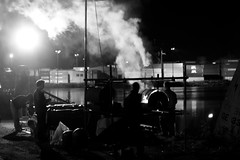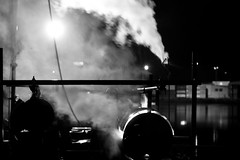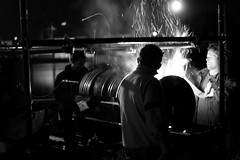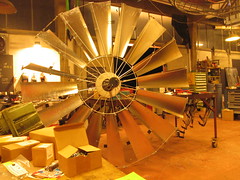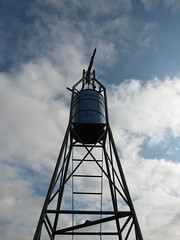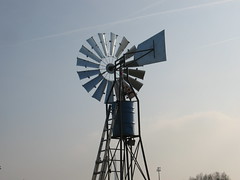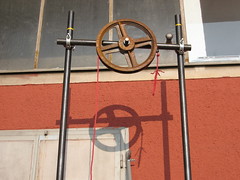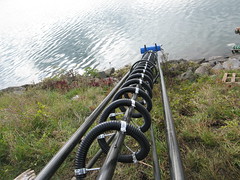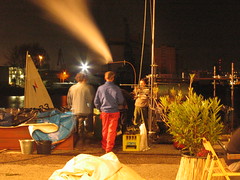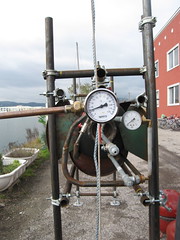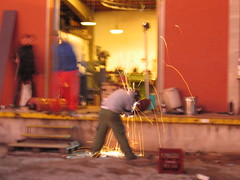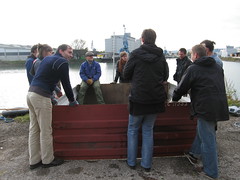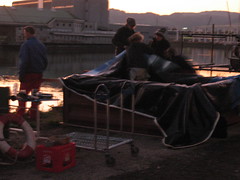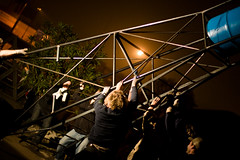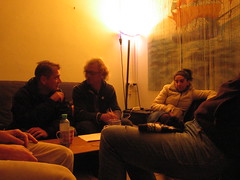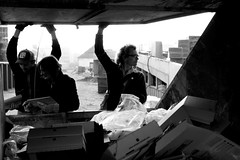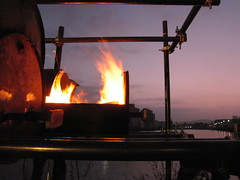Featured pages
Luminous Green 2007
Possible Futures...
Active Discussions...
Table of Contents
Luminous Green Workshop by Time's Up
workshop notes. 23-25 October 2008, Linz, Austria
The workshop in Linz at the Time's Up laboratories is concentrated on very detailed hands-on-practice where we would like to offer a simple and barrier-free approach through the backing of experts. This part of the workshop will focus on the creation of an environment that uses energy in sustainable ways and each constructed device fertilizes another. Having this in mind we would like to build an outdoor hot tub that is solely and independently in terms of energy usage and suitable for all seasons.
As the Time`s Up workshop is situated next to the Danube the chance opened up to use this water for our intentions. And as breezes go by more often it seemed natural to take advantage of that too to build a wind powered water pump that delivers water from the Danube directly to the basins. Time`s Up is currently working on that and developed further plans to offer a pimping-station for the immediate physical and creative recreation of all workers. In addition the hot tub is meant to be as all season summer outdoor-experience for those of us who dare the climate situation in colder days or do not have to chance to vanish from winter.
Besides the hands on part we will take more overarching theoretical aspects into consideration too. As we would like to look over the rims of individual tea cups without discussing global troubles in common, we have chosen the approach to take a look at groups that organize their individual interests in order to change their immediate environments strongly. We would like to get an impression of local based issues and conflicts that entail potential to stimulate engagement and initiatives on a communal level to force self-organized behaviour. We also would like to introduce more abstract appearing concepts about social and economic systems that are established bottom-up, issues of daily live we should reconsider and arising models that are getting relevant for the development of a global society. There are endless issues that are worth to work on within this context, but the main substructure of our intention is to turn our and your individual awarness into action, into a perspective that offers opportunities and sketches how to create ‚our world‘. We gather our individual standards as a basis for the turnover of future ideas and personal involvements.
- Time's Up: http://timesup.org/
- FoAM: http://fo.am/
- Andreas Strauss: http://andreasstrauss.com/
- Paul Schausberger: http://www.vt.tuwien.ac.at/ http://www.wabag.com/
- Folke Köbberling: http://www.folkekoebberling.de/
- Christian Siefkes: http://www.siefkes.net/
Background information and assorted references can be found in the Library
Project base
For this workshop we have collected some project parts that fit together as a starting scaffolding for plans, designs, building and rebuilding. While we believe that these plans are realisable and will be carried through, we remain wide open to other possibilities for projects in the format.
Windmill - water source:
This project, already mostly complete, is based upon the use of a third world technology base in order to get water up from the Harbour for use in a water system. The windmill runs (in case we have wind), running two pumping systems. The first system is an Archimedes Screw, a pump system that dates back millennia. The water is brought from the harbour up to a reservoir at ground level. A second Rope Pump, an very simple system, brings that water up to the second reservoir, around 3 meters above ground level.
- Rope pump: http://www.akvo.org/wiki/index.php/Rope_pump
- Screw pump: http://en.wikipedia.org/wiki/Archimedes_screw
Water Filter:
A simple and easily constructed water filter system to take out the impurities in the water. The Danube and the Harbour water is actually almost drinking quality, so the filtering that is needed is mainly aesthetic, getting rid of the suspended particles, glacial dust and river mud, algal growth and suchlike.
Steam production:
A simple burner system based upon 200 liter tanks, previously used for heating oil or fruit juice concentrate, with waste wood from the surrounding industry (shipping pallets, etc). This heat is transferred to an old boiler removed from a building heating system which produced steam at slightly above atmospheric pressure. The steam is streamed trough the fire again to reach a temperature around 150 degrees.
Baths:
A number of simple bath systems are the end point of this network. Filtered water is fed under wind power slowly into a bath. The steam supply, a very efficient way of transferring heat energy (it is how the planet does it) is fed into the water, the steam recondensing and releasing its heat into the body of water. This heats the water, leading to a steamy winter Jakuzi system. The baths that are planned include ones built from a slice from a container from a design project and single person baths from fruit juice concentrate barrels.
Programme
Thursday 23rd October 2008
09.30 - 12.00
- Introduction Time's Up: http://www.timesup.org
- Introduction Andreas Strauss: http://flickr.com/photos/andreasstrauss
12.30 Lunch
- strudel with spinach&feta
13.30 - 18.30
- Introduction Waterpump
- Hands-on Oven
- Hands-on Hot tub
19.00 Dinner
- Pumpkin seed soup
- Sweet cheese dumplings with stewed fruit
Friday 24th October 2008
10.30 - 12.30
- Introduction Paul Schausberger: Slides
- Introduction Folke Köbberling: http://www.koebberlingkaltwasser.de/
- What to build:
12.30 Lunch
- wok fried vegetables with and without meat
13.30 - 18.30
- Hands-on Oven
- Hands-on Jacuzzi
- Filtering Water
- City Resource Walk
19.00 Dinner
- dumplings with mushroom sauce
Saturday 25th October
10.30 - 12.00
- Introduction Christian Siefkes: http://peereconomy.org/ Slides
12.30 Lunch
- stuffed peppers
13.30 - 18.30
- Hands -on Oven
- Hands-on Jacuzzi
- Filtering Water
- Build an Environment
19.00 Dinner
- vegetable lasagne
Photographic traces are to be found on:
This workshop is a part of gRig, the Guild for Reality Integration and Generation, supported by the European Union as a part of the Culture 2000 Programme.

